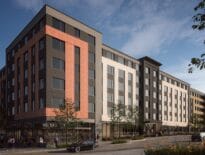
Malia Lazu
This year Boston’s mayor race is in color – a welcome change in a city that has been “minority majority” for more than two decades. Based on the race before us today, this will be the year when people who hold the levers of power must respond to a changing electoral environment, let go a little and allow different flowers to bloom.
For many reading this, the diversity of this group of candidates also signals a set of relatively progressive values. This may be a cause for concern for developers, who may be worried that a lack of personal relationships and a move toward progressive policies could be bad business. I was listening to WGBH’s Boston Public Radio the week Mayor Kim Janey took the city’s helm and Boston Globe editor Brian McGrory mused that he did not have the acting mayor’s number in his cell phone.
This off-the-cuff remark illuminates the gap between non-traditional and traditional power. In recent memory, Boston’s institutional and financial power brokers have rarely had to reckon with anyone outside of their circle with greater power than their own. The mayor’s race is reflective of a rapid change in that landscape.
Much at Stake
For years, people of color have been forced to navigate and rely on the benevolence of traditional power structures in order to make progress. But they have not been blind to its shortcomings. We were the last city in the country to desegregate and continue to build white enclaves like the Seaport.
Local races greatly impact the environment for real estate developers and can change the environment for local banks. But more importantly, city politics shape a city’s culture and a city’s culture affects businesses ability to attract and retain talent and, with it, new ideas. Millennials are the largest and most diverse generation. And minority communities are where the growth – consumers and workforce alike – lies. According to a Brookings Institute study, young adult urban core populations “increased by 4.9 percent over from 2010-2015, and racial minorities contributed the lion’s share – 87 percent – of that growth”.
Boston is a rich city. Due to that higher than typical baseline, we have been able to insulate ourselves and reject the notion of racism can have a lasting effect. However, we know we have an inclusion problem. We know we have a diversity problem. And over the long term, that will translate into an economic problem. Building luxury homes when the average Black family has $8 of wealth and other people of color don’t have much more doesn’t set us up for future economic, social or cultural success.
To quote Jane Jacobs, “There is no way of overcoming the burden of big plans…Genuine, rich diversity of the built environment is always the product of many, many different minds… Diversity is a small-scale phenomenon.” Thirty years later Boston is still using urban renewal and big plans to wallpaper over the fact that Boston development may have too few minds (and too-homogeneous ones) involved in planning. Boston is great with big plans, but has failed to figure out how to sustain small plans in a scalable way.
Power Must Change with City
The people of Boston (those here and those displaced) have been building small economies and asking for significant changes in policy that would help Boston be more equitable. Ten years ago, I helped launch Future Boston Alliance which brought over 30 Women and Minority Business Enterprise (WMBEs) businesses to market, promoted greater transportation access and worked with then-Councilwoman Ayanna Pressley to get more liquor licenses, increasing the number of Black liquor license-holders from three to nine, out of almost 1,900 total licenses city-wide.
This work advances with increasingly relevant organizations like Boston While Black, BECMA and Amplify Latinx, all of which organize people of color and are playing an increasing role in setting the tone for the city’s policies, business and culture. The Museum of Fine Arts and other institutions have made great strides in attracting a more diverse and young audience with efforts like Juneteenth takeover and the Basquiat exhibit.
A natural extension of a more diverse City Council, new business groups led by people of color and traditional establishments being held accountable on diversity is a shift in leadership at City Hall. It’s not just the Black, Latinx, Asian and other underrepresented communities that need a mayor who understands Boston must learn the importance of small plans to scale and execute. It is for the future of our economy.
The election is a referendum on monied power in Boston and whether it will let new kinds of organized power lead us into the future. I’m confident that the city is ready for that bold vision – and that includes its business community.
Malia Lazu is a lecturer in the Technological Innovation, Entrepreneurship and Strategic Management Group at the MIT Sloan School of Management, CEO of The Lazu Group and former Eastern Massachusetts regional president and chief experience and culture officer at Berkshire Bank.





